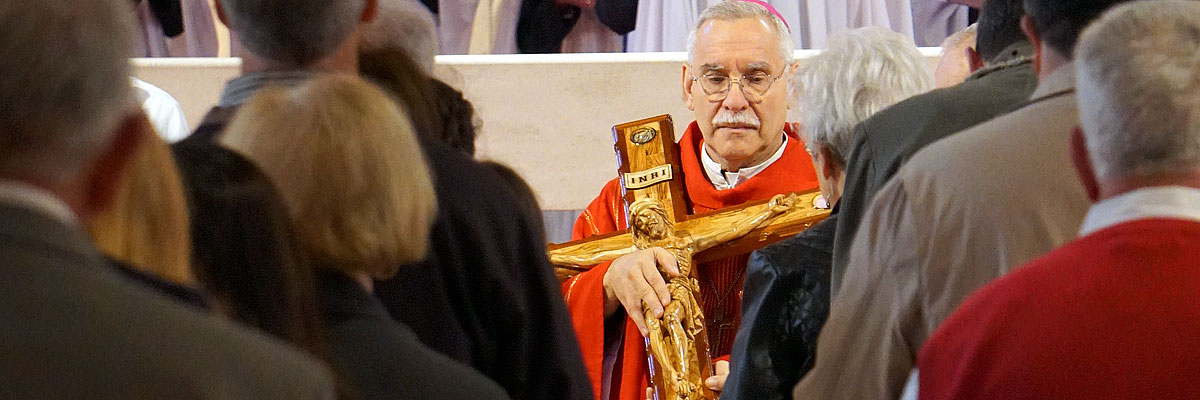Official Website of the
Catholic Diocese of Little Rock
19th Sunday in Ordinary Time, Year A
Published: August 9, 2020
Bishop Anthony B. Taylor preached the following homily at the House of Formation in Little Rock on Sunday, Aug. 9, 2020.

Bishop Taylor
On Aug. 6 we had the 75th anniversary of the bombing of Hiroshima and on Aug. 9 the 75th anniversary of the bombing of Nagasaki, the first and only times that nuclear weapons have been used.
These nuclear bombs unleashed a strong, fiery wind that shook the cities to their foundation and took over 175,000 lives, but in the words of today’s first reading, the Lord was not in the wind and fire. He is in the tiny whispering sound of those who work for peace.
While these bombings did serve to bring a quick end to the Second World War, probably saving the lives of many U.S. soldiers, it did so by targeting the civilian population, a clear violation of Catholic moral teaching.
It is not my role to enter into the politics involved, but it is my duty to point out the moral issues and explain the explicit teaching of the Catholic Church, which in this case is stated clearly in the catechism for all too see.
As the Catechism of the Catholic Church says in §2314, "Every act of war directed to the indiscriminate destruction of whole cities or vast areas with their inhabitants is a crime against God and man, which merits firm and unequivocal condemnation. A danger of modern warfare is that it provides the opportunity to those who possess modern scientific weapons — especially atomic, biological, or chemical weapons — to commit such crimes."
And to counter those who argue that possessing nuclear weapons serves as a deterrence to first strikes against the United States, the catechism adds in §2315, "The accumulation of arms strikes many as a paradoxically suitable way of deterring potential adversaries from war. They see this as the most effective means of ensuring peace among nations. This method of deterrence gives rise to strong moral reservations. The arms race does not ensure peace. Far from eliminating the causes of war, it risks aggravating them. Spending enormous sums to produce ever new types of weapons impedes efforts to aid needy populations; it thwarts the development of peoples. Over-armament multiplies the reasons for conflict and increases the danger of escalation."
That whole section of the catechism merits careful study and is a call to action.
Moreover, you may know that this week during his in-flight press conference aboard the plane bringing him back to Rome from his visit to Hiroshima and Nagasaki to mark this anniversary, Pope Francis took this one step further, saying: “The use of nuclear weapons is immoral, which is why it must be added to the Catechism of the Catholic Church. Not only their use, but also possessing them; because an accident or the madness of some government leader, one person’s madness can destroy humanity.”
One way to learn more about this pro-life issue would be to engage with: "Back from the Brink: The Call to Prevent Nuclear War," which is founded on these Catholic principles. You can find information about this campaign on the Internet at preventnuclearwar.org. One way to get involved locally would be to join the Pax Christi movement right here in Little Rock. Nuclear weapons pose such a great threat that doing away with them is a "right to life" issue for us all.
It is not my role to enter into the politics involved, but it is my duty to point out the moral issues and explain the explicit teaching of the Catholic Church, which in this case is stated clearly in the catechism for all too see. I know that Church teaching may elicit a very strong response from people who are convinced that these weapons are needed for deterrence — on this we can agree to disagree, but even if that were true, a handful of such weapons would more than suffice — 14,000 nukes is literally overkill!
In our first reading today the prophet Elijah, has a powerful experience of the presence of God, which I alluded to at the beginning of this homily. A strong heavy wind was rending the mountains and crushing rocks before the Lord — but the Lord was not in the wind. After the wind there was an earthquake — but the Lord was not in the earthquake. After the earthquake there was fire — but the Lord was not in the fire.
After the fire there was a tiny whispering sound. And it was in that peaceful moment that Elijah encountered the Lord. And the same is true for us. At Hiroshima and Nagasaki, nuclear bombs unleashed a strong, fiery wind that shook the cities to their foundation and took over 175,000 lives, but the Lord was not in that wind and fire. He is in the tiny whispering sound of those who work for peace.









